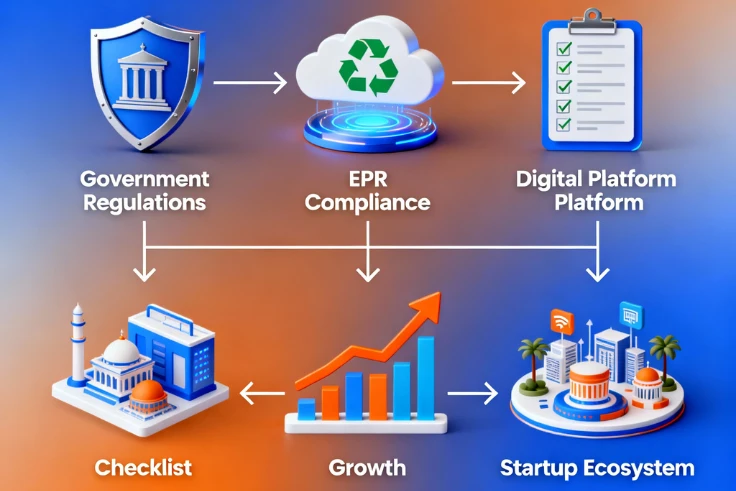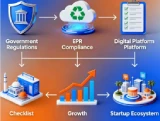Indian businesses this year are being subjected to many regulations. Legal compliance trends change at the speed of light, and entrepreneurs must keep themselves updated to sidestep issues. Non-compliance can result in penalties, delays, and a negative reputation. For entrepreneurs, an awareness of the law and adherence to it with utmost care is necessary to establish a successful, smooth business.
Table of Contents
Understanding Compliance Requirements

All business people have to be familiar with what the law demands. For example, compliance requirements for entrepreneurs include paying taxes in a timely manner, having accurate records, labour and environmental regulations, and being licensed. These are not formalities, because they keep businesses safe from penalties and lawsuits.
One particular need assuming greater significance is the Extended Producer Responsibility certificate, assuring that companies manufacturing products adhere to environmental principles. Manufacturers and e-commerce business owners have to be more cautious towards this. Converting records into digital format is also becoming more necessary as governments shift towards digital audits and online reporting. Having accounts, employee data, and compliance reports maintained through software helps in easier compliance with such needs.
Proper planning and organisation make compliance easier. Business owners need to chart out timelines for filing documents, license renewals, and reporting information. Being aware at an early stage helps avoid rushes at the final moment and avoids penalties.
Common Compliance Challenges
Even with planning, companies have several compliance challenges for entrepreneurs. Legislation is constantly changing, and it is difficult to keep up with the changes. Today’s law can become something else tomorrow, and failure to adhere to a deadline may result in a fine or legal issues.
Several approvals and licenses are yet another challenge. Various departments of the government require different documents, and small business owners might find it hard to keep them. Cost is also an issue, as employing professionals or purchasing computer programs to manage compliance might seem costly, but it’s less costly than the cost of having to pay fines or lawsuits in the future.
The data of customers has to be safeguarded by business owners, and if not done in the context of meeting privacy regulations, then there will be fines and erosion of public trust. Labour laws, the environmental process, and the reporting process also consistently create issues. Pre-anticipation of the same issues can reduce risk and enable business owners to operate their business issue-free.
The Role of Technology in Compliance
The future of business compliance is significantly interlinked with technology. Automation ensures organisations monitor deadlines, report in real time, and control risks in real time. Businesspeople no longer have to trust in manual treatment, which is time-consuming and prone to errors.
Ethical business and sustainability are also becoming ingrained elements of compliance. Compliance regulators are also placing more emphasis on environmental issues, corporate governance, and employee well-being. Entrepreneurs who comply with these trends not only comply with the rules but also gain the confidence of customers and investors.
Evolving technologies such as blockchain and artificial intelligence (AI) are being re-engineered as compliance solutions. AI can scan data, identify risks, and verify the credibility of reports. Blockchain can monitor transactions and verify that documents are genuine. Organisations that adopt them first will be given a competitive advantage while in compliance with business laws and compliance standards.
Legal and Compliance Solutions for Entrepreneurs
There are simple steps entrepreneurs can take to remain compliant. Legal and Compliance Solutions range from hiring specialists, employing compliance software, and performing internal audits at regular intervals. Audits assist in identifying problems before they become major issues, and companies can correct them early.
Entrepreneurs must go through workshops, webinars, and compliance training programs. Training in new regulations and laws equips them to anticipate compliance issues for business people. Clear instructions make it easy for employees to abide by the laws, reducing mistakes and allowing seamless operation.
It is also a good idea to hire experts to perform compliance work. Experts are in front of new legislation, so there is less space to miss a deadline or be incorrect on a law. Business owners can grow their businesses without being in trouble with professional assistance and software.
Strategies to Stay Ahead
In 2025, corporate leaders should have a positive approach to compliance. Real-time monitoring of activity, timely filing of papers, and keeping abreast of new regulations are top priorities. Working closely with lawyers and compliance specialists provides immediate advice and expert guidance.
Local rules also follow international trends. Business owners need to anticipate plans for global expansion, and this implies awareness about other compliance issues. A compliance culture within the company facilitates the individual member to understand the importance of conforming to rules. This reduces risk, enhances efficiency, and builds business image.
The Long-Term Benefits of Compliance
Compliance as a priority offers more than legal protection. Compliant companies essentially gain long-term advantages, including increased customer confidence, enhanced investor confidence, and effective operations. Compliance prevents costly mistakes that will discourage business expansion.
Using technology, documentation, and employee education on regulations ensures sustained success. Business owners who invest in compliance today will save on fines and gain a benefit in an ever-evolving landscape.
To Conclude
Compliance trends of the law are transforming business activities in 2025. Entrepreneurs who comprehend compliance needs, resolve compliance issues, and implement effective legal and compliance solutions will succeed.
The future of compliance for business will be technology-driven, automated, and ethical. With business law compliance and compliance standards, entrepreneurs can avoid risks and earn stakeholder’s trust. Keeping current, ahead of the curve, and building a culture of compliance will help businesses thrive to successfully navigate legal compliance trends in 2025. Staying compliance-oriented with their business model will enable business leaders to ensure their business remains in business but thrives in the complex control of regulations.
Also Read: EPR Authorization: Benefits, Requirements & Pitfalls




